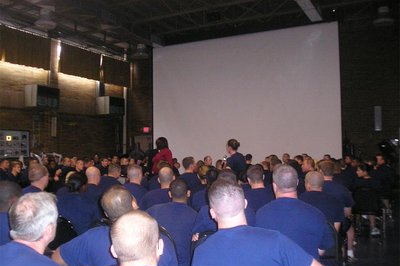“My reality might not be your reality, but my reality is my identity, and all you gotta do is respect that. ”
That was the message Jaci Adams, a member of the LGBT Police Liaison Committee, tried to communicate to the city’s incoming rookie police officers, who underwent an LGBT-awareness training this week.
The 157 cadets gathered in the auditorium of the Police Academy in Northeast Philadelphia Sept. 28 to hear a presentation by committee members Adams, Fred Bostwick, Gloria Casarez, Jack Barry, Robert Tuerk, Maria Gonzalez and police liaison Deputy Commissioner Stephen Johnson.
The cadet class, which graduates next week, could be the last for some time. No other cadet classes are scheduled currently because of a lack of city funding, although the committee could offer the training to “laterals” or non-rookie officers who come into the city from other areas if such a group is hired.
The afternoon session kicked off with a message from Johnson, who explained his role as liaison and the duties of the committee, which works to facilitate the relationship between the LGBT community and police.
Bostwick led the cadets through a presentation on the LGBT community, covering everything from the early LGBT-rights movement in Philadelphia to the layout of the Gayborhood and its gathering spots. He displayed photos of popular LGBT symbols like the rainbow flag or the pink triangle, and provided statistics on the neighborhoods with the highest populations of LGBT people, although he cautioned that the LGBT community is spread throughout the city and not just concentrated in the Gayborhood. He also reviewed preferred terminology, such as sexual orientation over sexual preference and LGBT over homosexual.
The cadets were asked to voice their opinions on what makes LGBT people different or similar to heterosexuals, and several noted that more similarities than differences exist — such as the fact that LGBTs are also sons, daughters, brothers and sisters.
To emphasize that LGBTs are everywhere, Bostwick asked for a show of hands of how many cadets have a family member, friend or know someone who identifies as LGBT, and nearly everyone raised a hand.
When Barry took the microphone later, he asked the cadets if they’d ever had coffee or dinner with an LGBT person and, again, nearly every hand was raised. No cadet, however, raised his or her hand when asked if they were uncomfortable during the time they spent with an LGBT person.
Casarez reviewed the current legislative state for LGBT people and detailed her role as the city’s director of LGBT affairs, offering herself and her office as a resource for the cadets.
Tuerk attempted to illustrate for the cadets that LGBT stereotypes often do not hold up. An athlete himself, he noted that most of the cadets may not have considered him to be gay upon first glance, demonstrating that characterizing gay men by the extremes shown in the media could not only be offensive, but potentially dangerous for the police.
The cadets were offered a unique point of view from Gonzalez, a retired police officer.
Gonzalez worked for the department for 40 years — about half of which were spent as a firearms instructor at the Police Academy, and retired in 2007 — shortly after coming out as transgender. Gonzalez discussed her experiences on the force and the support she saw from most of her superiors when she made the decision to transition.
While she noted she has had very few negative reactions from others over the last few years, she cautioned the cadets to not make assumptions about their fellow officers or the people they encounter in their districts, as they can’t be certain they’re not going through the same internal struggles she endured during her time on the force.
The cadets were put to the test in a role-play situation, in which Gonzalez pretended to be a driver pulled over for a broken taillight. Gonzalez presented the two cadets who volunteered with a license with a male name and gender marker on it, and they were asked to come up with a response. In the exchange, the pair questioned Gonzalez as to how she identified and subsequently referred to her as ma’am and with female descriptors.
When it was Adams’ turn to speak, she delivered a high-volume invective to demonstrate to the cadets that they need to be prepared for anything. As a former criminal herself, Adams sought to show the cadets that they can’t expect respect from the people they encounter on the street. She also criticized them sharply for the inattention she claimed some of them showed during the presentation.
“Respect is worked for. And if you don’t show it to other people, you’re not getting it back.”
Adams said the dearth of questions that had been asked by the cadets was unacceptable and she stressed that the committee was looking to arm the new officers with enough information so that they can protect themselves once they hit the streets.
By the end of the session, several cadets stood and questioned the committee members on their own coming-out experiences and hate-crimes statistics and, when the session finished, gave the committee a standing ovation.
Jen Colletta can be reached at [email protected].
